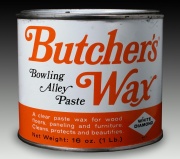Difference between revisions of "Bowling Alley wax"
Jump to navigation
Jump to search
m (Text replace - "== Authority ==" to "== Sources Checked for Data in Record ==") |
|||
| Line 1: | Line 1: | ||
| + | [[File:butchers wax.jpg|thumb|Butcher's wax]] | ||
== Description == | == Description == | ||
| Line 14: | Line 15: | ||
|- | |- | ||
! scope="row"| Melting Point | ! scope="row"| Melting Point | ||
| − | | ~ 75 | + | | ~ 75 C |
|} | |} | ||
| − | == | + | ==Resources and Citations== |
| − | Butcher's Wax: [http://www.butcherwax.com/ Website] | + | * Butcher's Wax: [http://www.butcherwax.com/ Website] |
| − | |||
| − | |||
* G.S.Brady, ''Materials Handbook'', McGraw-Hill Book Co., New York, 1971 Comment: p. 148 | * G.S.Brady, ''Materials Handbook'', McGraw-Hill Book Co., New York, 1971 Comment: p. 148 | ||
Latest revision as of 08:52, 10 May 2022
Description
turned off and combined under butcher's wax -[Butcher Co., MA] A brand name for wax blend. Bowling Alley wax was first sold in 1880 in Boston by C. Butcher. It is a blend of carnauba and microcrystalline waxes blended with Mineral spirits and turpentine. Also called Butcher's wax, Bowling Alley wax has been used to clean and polish wood floors, furniture, metal, leather, and musical instruments. It has also been used on outdoor sculpture as a protective coating over Incralac.
Synonyms and Related Terms
Butcher's wax
Other Properties
Soluble in turpentine, mineral spirits.
| Melting Point | ~ 75 C |
|---|
Resources and Citations
- Butcher's Wax: Website
- G.S.Brady, Materials Handbook, McGraw-Hill Book Co., New York, 1971 Comment: p. 148
- Marie Svoboda, Conservation Survey Index, unpublished, 1997
- Conservation Support Systems, Catalog, 1997
- Product Information Comment: From can, 1999
